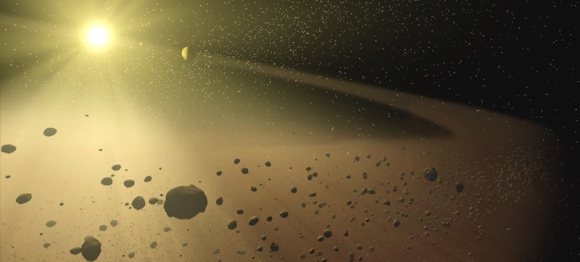Written by Ian O'Neill

Primordial black holes (PBHs) are getting mischievous again. These artefacts from the Big Bang could be responsible for hiding inside planets or stars, they may even punch a neat, radioactive hole through the Earth. Now, they might start playing interplanetary billiards with asteroids in our solar system.
Knocking around lumps of rock may not sound very threatening when compared with the small black holes' other accolades, but what if a large asteroid was knocked off course and sent in our direction? This could be one of the most catastrophic events yet to come from a PBH passing through our cosmic neighborhood…
As a race, we are constantly worried about the threat of asteroids hitting Earth. What if another large asteroid - like the one that possibly killed the dinosaurs around 65 million BC or the one that blew up over Tunguska in 1908 - were to come hurtling through space and smash into the Earth? The damage caused by such an impact could devastate whole nations, or plunge the world as we know it to the brink of extinction.
But help is at hand. From the combined efforts by groups such as NASAs Near Earth Object Program and international initiatives, governments and institutions are beginning to take this threat seriously. Tracking threatening Near Earth Asteroids is a science in itself, and for now at least, we can relax. There are no massive lumps of rock coming our way (that we know of). The last scare was a comparatively small asteroid called "2008 CT1" which came within 135,000 km of the Earth (about a third of the distance to the Moon) on February 5th, but there are no others forecast for some time.
So, we now have NEO monitoring down to a fine art - we are able to track and calculate the trajectory of observed asteroids throughout the solar system to a very high degree of accuracy. But what would happen if an asteroid should suddenly change direction? This shouldn't happen right? Think again.
A researcher from the Astro Space Center of the P. N. Lebedev Physics Institute in Moscow has published works focusing on the possibility of asteroids veering off course. And the cause? Primordial black holes. There seems to be many publications out there at the moment musing what would happen should these black holes exist. If they do exist (and there is a high theoretical possibility that they do), there's likely to be lots of them. So Alexander Shatskiy has gotten to the task of working out the probability of a PBH passing through the solar systems asteroid belts, possibly kicking an asteroid or two across Earths orbit.
Shatskiy finds that PBHs of certain masses are able to significantly change an asteroids orbit. There are estimates of just how big these PBHs can be, the lower limit is set by black hole radiation parameters (as theorized by Stephen Hawking), having little gravitational effect, and the upper limit is estimated to be as massive as the Earth (with an event horizon radius of an inch or so - golf ball size!). Naturally, the gravitational influence by the latter will be massive, greatly affecting any piece of rock as it passes by.

Should PBHs exist, the probability of finding one passing though the solar system will actually be quite high. But what is the probability of the PBH gravitationally scattering asteroids as it passes? If one assumes a PBH with a mass corresponding to the upper mass estimate (i.e. the mass of the Earth), the effect of local space would be huge. As can be seen from an asteroid map (pictured), there is a lot of rocky debris out there! So something with the mass of the Earth barrelling through and scattering an asteroid belt could have severe consequences for planets nearby.
Although this research seems pretty far-fetched, one of the calculations estimate the average periodicity of a large gravitationally disturbed asteroids falling to Earth should occur every 190 million years. According to geological studies, this estimate is approximately the same.
Shatskiy concludes that should small black holes cause deflection of asteroid orbits, perhaps our method of tracking asteroids may be outdated:
"If the hypothesis analyzed in this paper is correct, modern methods aimed at averting the asteroid danger appear to be inefficient. This is related to the fact that their main idea is revealing big meteors and asteroids with dangerous orbits and, then, monitoring these bodies. However, if the main danger consists in abrupt changes of asteroidal orbits (because of scattering on a PBH), revealing potentially dangerous bodies is hardly possible."

Nenhum comentário:
Postar um comentário